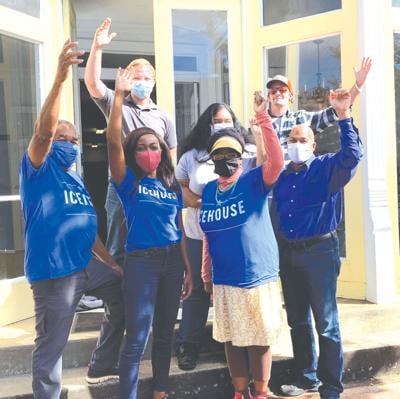Last week, Robert Steverson offered a proper summation of what the Ice House Entrepreneurship Program offered through Frontier Warren was designed to do.
The eight-week Ice House class, held via Zoom once per week, recently celebrated the graduation of more than a dozen students ranging in age from 18-70, including Steverson, a Warren County native and accomplished entrepreneur in his own right.
The class, sponsored and funded by NC IDEA, focuses on teaching the principles of entrepreneurship rather than only the process of becoming successful professionally, Steverson said, adding “mindset” is the key.
“If I can change the mindset, I can change the procrastination,” said Steverson. “I can get past the hesitancy to do something even though I can see the need.”
The “need” Steverson is referring to is the principle of identifying a need, like co-author Clifton Taulbert’s Uncle Cleve in his book “Who Owns the Ice House?”
The book, on which the class name is based, chronicles the lessons Uncle Cleve taught Taulbert, accrued by Uncle Cleve by building the only ice house in a cotton-farm town on the Mississippi Delta.
“The purpose of the Ice House program is to ask what can we do today to support tomorrow’s unlikely entrepreneurs,” Ice House program leader Daisy Magnus-Aryitey said in a YouTube video describing the class.
Along with serving as the NC IDEA program director, Magnus-Aryitey previously worked as the programs director for Code the Dream, a Durham-based tech nonprofit that offers training in software development to people from diverse low-income backgrounds.
The concept of bringing Ice House classes to the area started with Frontier Warren, the brainchild of former Warren County Economic Development Commission Director Stacy Woodhouse and Warrenton Town Administrator Robert Davie.
Woodhouse is no longer with the county but is seeing the Frontier Warren project through and served as a representative leading the Ice House Class, which was originally intended to be an in-person venture before COVID-19 struck.
Zoom did the trick though.
“I think every high school student should take it,” Woodhouse said. “I think every employer should have their employees take it.”
Steverson’s daughter, Korita Steverson, also participated in the class. An aspiring entrepreneur who grew up in Greensboro, she is currently working remotely out of the newly-opened Frontier Warren offices on Main Street for a diversified industrial manufacturing Buncombe County company.
Eventually, Korita Steverson hopes to open several businesses in Warren County.
She said the fields of interest represented in the program varied from art to meat processing.
“It’s not a group where you’re going to feel out of place with your ideas,” Korita Steverson said. “... Everyone is trying their best to get people’s businesses off the ground and trying to work as a team.”
Out of the original class, an extended networking group, still meeting weekly by Zoom, grew. The meetings provide a space to continue sharing ideas and promoting synergy.
A second round of Ice House classes is also in the works with a pair of different emphases: one for those currently employed in an entrepreneurial-driven business and one where that’s not a prerequisite.
“The idea is that if you’re an employee and if you understand how your entrepreneurial boss thinks, it makes you a better employee,” Woodhouse said. “It might make you more apt maybe someday to get a management position if you better understand the thinking process that an entrepreneur goes through.”
It all goes back to mindset.
“We want to see this network grow,” Steverson said, “and leverage the resources of all those who want to work to make Warren County better.”







Commented
Sorry, there are no recent results for popular commented articles.